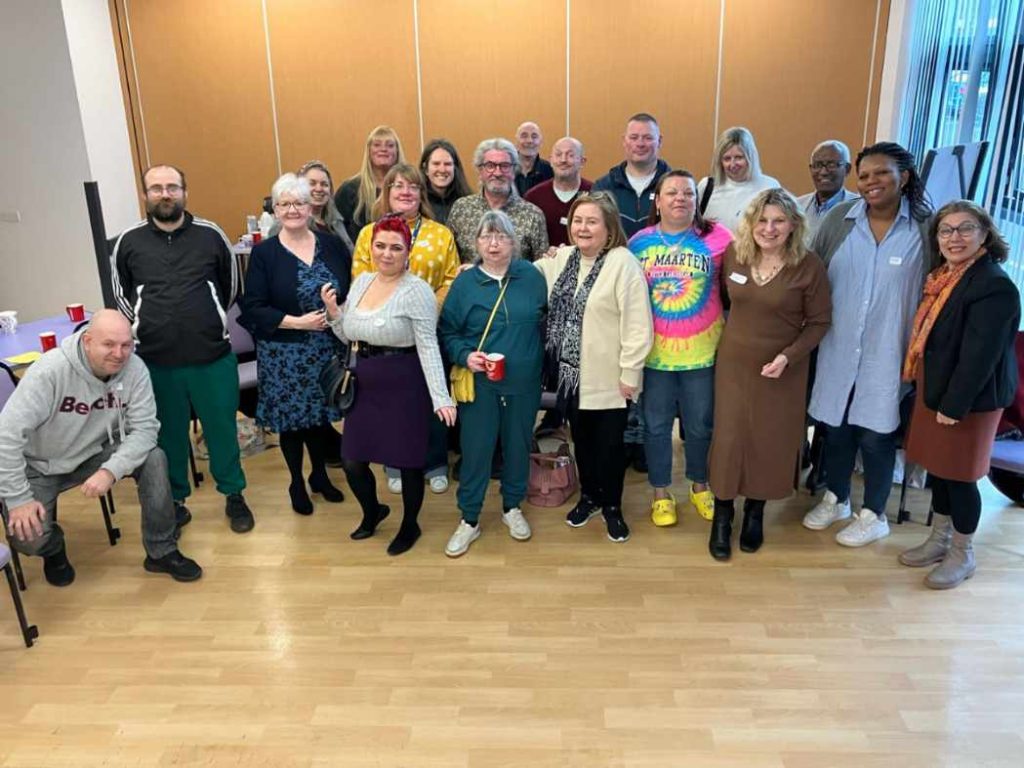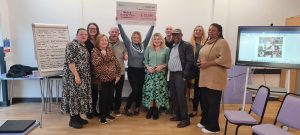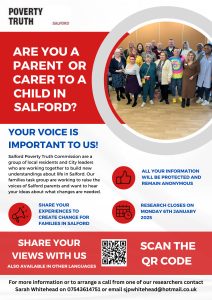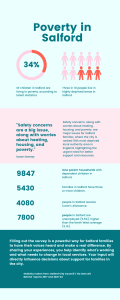
A community research project has been launched to help better understand the challenges and needs faced by parents, guardians, and caregivers in Salford.
The Salford Poverty Truth Commission are leading an initiative that will invite families to share their experiences, helping shape the support and services available, and fostering a more inclusive, compassionate city.
The commission was launched in July 2016 and has been used to serve the community and improve their lives.
Salford faces significant challenges this year, 333,000 children in Greater Manchester and Lancashire are without sufficient food, clothing, and sometimes even shelter— a number that has risen by 31,197 compared to the previous year.
This is particularly concerning for Salford, where around 30% of children in 2024 are living below the poverty line, according to researchers at Loughborough University.
Sarah Whitehead, Lead Facilitator of the Salford Poverty Truth Commission, said: “The Salford Poverty Truth Commission has been working together for 18 months, bringing together local residents and professionals from housing, health, education, and local authority services to better understand the issues of poverty in Salford and take action for change.”
To achieve meaningful progress, the commission has designed an anonymous survey that allows families to voice their struggles and propose solutions.
Sarah emphasises the importance of listening to the community, she added: “We want to hear from parents about the things they’re struggling with, what’s working well for them, and what needs to change.
“We’re not making assumptions—we want to learn from their voices.”

Through ongoing engagement, the commission has identified a range of issues affecting families across Salford, with safety in local neighbourhoods is a recurring concern.
Susan Downey, Children and Families Officer with Safeguarding and Child Protection responsibilities at a Salford primary school and contributor to the survey’s design said: “Parents often talk about feeling unsafe in their area, especially with cars speeding by and activity at night.
“Safety concerns are a big issue, along with worries about heating, housing, and poverty.”
Financial hardship also looms large for many families, exacerbated by the rising cost of living. Necessities like school uniforms and toiletries are out of reach for some families, highlighting the scale of the crisis.
The survey was developed collaboratively by local residents and professionals to ensure it reflects the real needs of Salford’s families.
As Sarah added: “This research was designed with a clear focus on giving people a platform to have their voices heard.
“We’ve ensured the survey is anonymous and accessible, making it easy for people to take part without fear of judgment.”
This approach aligns with the guiding principle of the commission, she continued: “Nothing about us, without us, is for us.” Decisions affecting families must incorporate their voices to be effective and sustainable.
Susan echoed this sentiment, as she said: “There’s a lack of empowerment for many parents. They need more support to access services, but they also need the confidence to do things for themselves, without hand-holding. It’s about guidance and empowerment.”

The feedback collected through this survey will directly inform Salford’s decision-makers, influencing policies in schools, health services, and local government.
Sarah said: “This research gives us a powerful opportunity to share parents’ voices in prominent spaces, including Salford’s working group on creating a child-friendly city and discussions within local schools and health services.”
By focusing on family-friendly initiatives, the commission hopes to rebuild community spaces and connections that have eroded over time. Susan highlighted the value of fostering these spaces.
As she continued: “If parents aren’t involved in anything until their child starts school, they’re often isolated and unsure who to trust.
“We need to bring back more community-focused activities like playgroups, where friendships can form and parents can communicate.”
The Salford Poverty Truth Commission encourages all parents, guardians, and caregivers to contribute to this vital research. Their input will shape the services and support structures that impact their lives, ensuring that future changes are rooted in the needs of the community.
This project is not just a survey, but a step toward creating a city where every family feels heard, supported, and empowered.
Sarah added: “We understand that people can be hesitant to share personal information, but we want to reassure them that this is a genuine opportunity to shape change for everyone in Salford.”
Families can complete the survey anonymously here.















Recent Comments